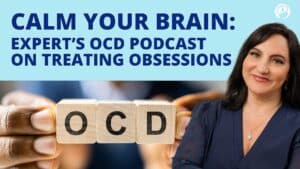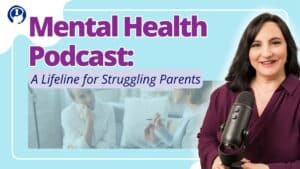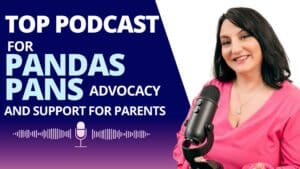Students with OCD can face a variety of challenges in the classroom, from difficulty concentrating to a long list of fear-driven behaviors. OCD fears can center on worries about self-harm, death, contamination, vomiting, etc.
Regardless of what intrusive thoughts a child has, it impacts their attention, thinking and ability to get school work done, as well as social and emotional functioning. It is a clinical condition that is scary for both parents and child because of how fear hi-jacked an OCD brain is. When that happens, there is no reasoning with a child.
Marley was able to hide her OCD for a long time until the writing demands of high school uncovered her writing rituals and perfectionism. Coupled with treatment in our BrainBehaviorReset ™ Program, Marely benefited from a 504 Plan with accommodations for writing. Instead of giving her extra time, which fed into her OCD, her teacher asked her to turn her work in with no revisions. She actually got downgraded if she made revisions. These exposures were done with support from our OCD specialist and the school team to help Marley cope with her intrusive thoughts. Over time, with neurofeedback, PEMF and OCD ERP therapy, Marely was able to completely extinguish her OCD.
Definition of OCD and Its Impact on Students in School
Obsessive-Compulsive Disorder, or OCD, is a mental health condition characterized by persistent, intrusive thoughts (obsessions) and repetitive behaviors or mental acts (compulsions) that are intended to neutralize or reduce the fear and anxiety caused by the obsessions. For example, a student with OCD might have an obsession with contamination and feel the need to wash their hands repeatedly to reduce anxiety.
OCD can have a significant impact on a student's ability to learn and thrive in school. Symptoms of OCD can interfere with concentration, increase anxiety, and cause social isolation. Students with OCD may struggle with completing assignments, participating in class discussions, and building positive relationships with peers and teachers.
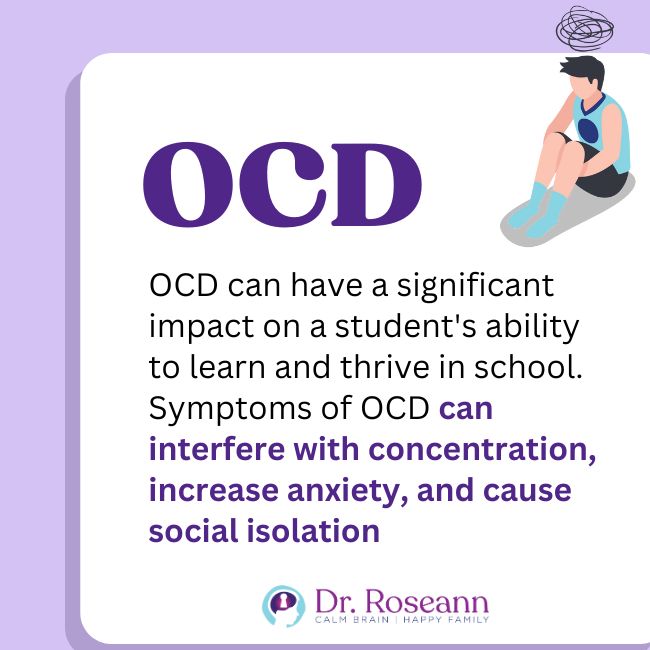
OCD can really take a toll on your child’s learning but it also affects relationships too.
How OCD Symptoms Affect Students at School
There are a lot of myths about OCD but OCD is all about avoiding that totally irrational “bad thing” from happening when you don’t complete a mental ritual or behavior. OCD can wax and wane depending on life stressors but it is very mentally draining because of an over activated brain.
The following symptoms can significantly impact a student's ability to learn and perform in the classroom, and can lead to social isolation and depression.
General Symptoms that Affect a Student in Academic Functioning:
- Excessive hand washing, including washing for a specific length of time or repeating a certain number of times
- Repeatedly checking or re-reading assignments or notes
- Counting items, such as steps or tiles, and feeling the need to count a certain number of times
- Arranging items in a specific order or pattern
- Excessive cleaning or organizing of items, such as desks or lockers
- Repeatedly seeking reassurance from teachers or peers
- Repetitive behaviors, such as tapping, touching, or humming
- Rituals or compulsions related to classroom routines or transitions, such as entering and exiting the classroom
- Heightened stress and delays during class transitions due to compulsive behaviors
- Increased frustration and outbursts during class due to difficulty controlling obsessive thoughts and compulsive behaviors.
Attention/Focus:
- Intrusive thoughts or images that interfere with concentration or cause distress
- Avoidance of certain materials or subjects due to fear of contamination or harm
Listening/Participation:
- Difficulty concentrating on what the teacher is saying due to intrusive thoughts or compulsions
- Misunderstanding key points or not giving prompt answers due to cognitive distortions or distraction by obsessions
- Avoiding topics or class activities due to fear of triggering obsessions or compulsions
Work Completion:
- Getting “stuck” on a question or task due to perfectionism or compulsive doubts
- Inability to skip items or move on due to the need to complete tasks perfectly
- Overthinking about questions or doubting one's answer due to obsessive doubts or fear of making mistakes
- Inhibition of ability to complete regular homework assignments due to compulsive behaviors
- Frequent class tardiness and inability to keep up with reading and writing responsibilities due to repetitive compulsions
- Increase in general school avoidance and decreased ability to concentrate during lectures
- Withholding of turning in already completed assignments due to obsessive doubts and need for constant reassurance
Exams/Quizzes:
- Difficulty preparing enough due to obsessions or compulsions taking up time and energy
- Challenges with multiple choice items and timed tests due to cognitive distortions or performance anxiety
- Uncertainty about the “right way” or “right answer” due to perfectionism or obsessive doubts
Reading:
- Being distracted from words due to focus on worries or rituals, such as counting letters
- Needing to re-read to fully understand meaning due to cognitive distortions or fear of making mistakes
- Avoiding certain words or phrases due to fear of triggering obsessions or compulsions
Math:
- Avoiding to complete problems that contain certain numbers or symbols due to superstitions or obsessive thoughts
- Redoing/re-checking problems multiple times due to compulsive doubts or fear of making mistakes
- Difficulty with rote memorization due to focus on obsessions or compulsions
Writing:
- Difficulty putting ideas on paper due to perfectionism or fear of making mistakes
- Tendency to excessively erase or re-write things due to compulsive doubts or fear of imperfection
- Taking too long to write sentences until they feel “just right” due to perfectionism or compulsive doubts
- Handwriting difficulty, either too rushed or too perfect, due to obsessions or compulsions.
- Difficulty taking class notes due to perfectionism.
Social Functioning:
- Impairment of normal social interactions and increased anxiety in speaking with teachers
- Unkind attention from peers due to repetitive externalized compulsions, leading to social isolation
- Heightened stress and delays during class transitions due to compulsive behaviors
- Increased frustration and outbursts during class due to difficulty controlling obsessive thoughts and compulsive behaviors.
Definition of 504 Accommodations and Their Purpose
Section 504 of the Rehabilitation Act of 1973 is a federal law that prohibits discrimination against individuals with disabilities in any program or activity that receives federal funding. Under Section 504, students with disabilities are entitled to receive special education and related services, as well as accommodations that allow them to participate in school activities on an equal basis with their peers.
504 accommodations are intended to provide individualized educational programming for students with disabilities, including those with OCD. Accommodations are meant to level the playing field and provide students with the necessary tools to succeed academically and socially.
Examples of OCD Accommodations That Can Be Helpful Students
The signs and symptoms of OCD are unique and affect what accommodations a child may benefit from. There are many accommodations that can be helpful for students with OCD, including:
- Extra time on tests and assignments to accommodate for obsessive doubts or compulsive behaviors
- Breaks during class to allow students to practice response prevention techniques or to manage anxiety
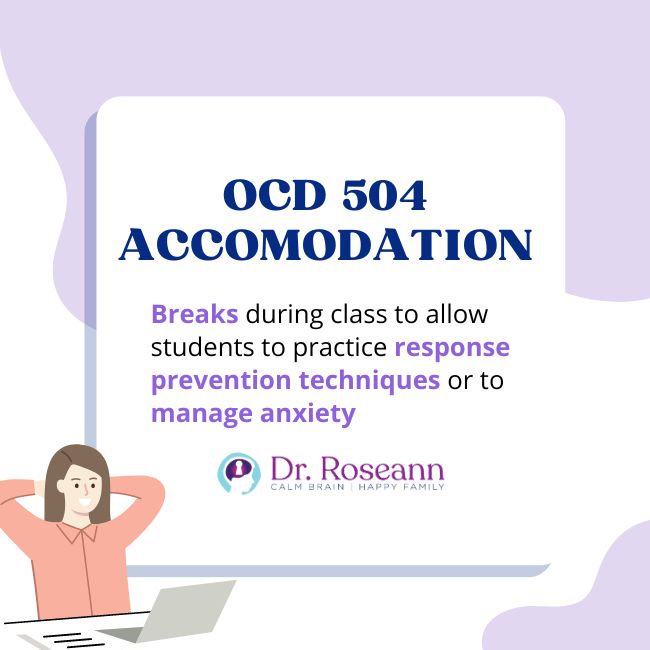
- Alternative assignments or assessments that allow students to demonstrate their knowledge in a way that accommodates their OCD symptoms
- Access to a quiet space or designated area to practice mindfulness or relaxation techniques
- Assistance with organizational skills to help students manage their compulsive behaviors related to cleaning or arranging items
- Opportunities to work with mental health professionals or guidance counselors to develop coping strategies for managing OCD symptoms in the school setting
These accommodations can be tailored to individual student needs and can be implemented in a way that supports the student's overall school performance and social well-being.
OCD Accommodations Related to Attention/Focus, Work Completion, Social Functioning
Attention/Focus:
- Providing a designated area in the classroom to reduce distractions
- Allowing students to wear noise-canceling headphones to block out external noise
- Allowing students to take breaks as needed to practice response prevention techniques or to manage anxiety
Work Completion:
- Allowing extra time on tests and assignments to accommodate for obsessive doubts or compulsive behaviors
- Providing alternative assignments or assessments that allow students to demonstrate their knowledge in a way that accommodates their OCD symptoms
- Allowing students to complete work in a quiet or designated area to manage anxiety related to classroom distractions
Social Functioning:
- Allowing students to take breaks as needed to practice response prevention techniques or to manage anxiety related to social interactions
- Providing social skills training to help students build positive relationships with peers and teachers
- Encouraging teachers to use positive reinforcement and praise to build confidence and motivation in students with OCD
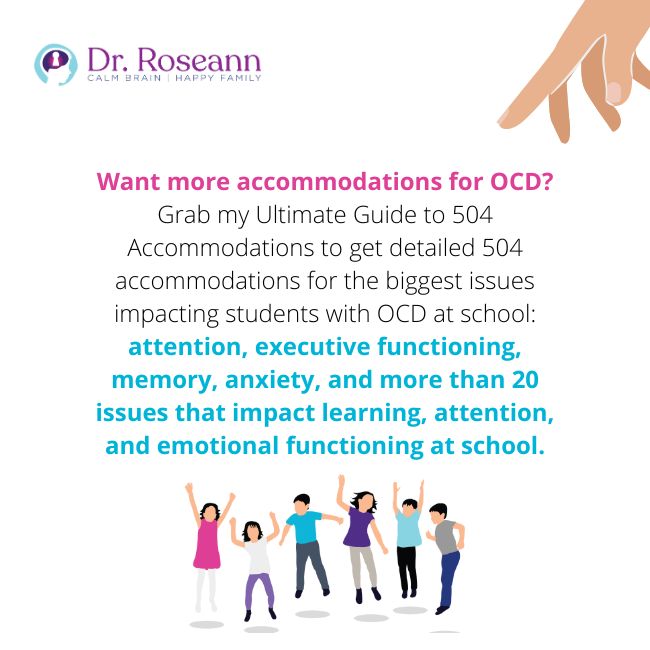
Want more accommodations for OCD? Grab my Ultimate Guide to 504 Accommodations to get detailed 504 accommodations for the biggest issues impacting students with OCD at school: attention, executive functioning, memory, anxiety, and more than 20 issues that impact learning, attention, and emotional functioning at school.
Individualized Education Plan (IEP) vs. 504 Accommodations
While both IEPs and 504 accommodations are designed to support children with disabilities, they are different in several ways. IEPs are designed for students who require specialized instruction and related services, while 504 accommodations are intended to provide individualized programming that allows students to participate in school activities on an equal basis with their peers.
IEPs require a more comprehensive evaluation and assessment process than 504 accommodations, and they require that an individualized education program be developed and reviewed annually. In contrast, 504 accommodations require that schools provide reasonable accommodations to students with disabilities without the need for an individualized education program.
Students with OCD can benefit from both IEPs and 504 accommodations, depending on the severity and impact of their symptoms on their ability to learn and participate in school activities.
Students with OCD can face significant challenges in the classroom, from difficulty concentrating to fear of contamination. However, with the support of educators, parents, and mental health professionals, these students can succeed academically and socially through the use of 504 accommodations.
By understanding the impact of OCD on students in school and the types of accommodations that can be helpful, we can ensure that all students, including those with disabilities, receive the support they need to thrive in the educational setting. Through effective communication and collaboration between school personnel, mental health professionals, and families, we can create a supportive and inclusive environment for all students, regardless of their individual needs.
Want more accommodations for OCD? Grab my Ultimate Guide to 504 Accommodations to get detailed 504 accommodations for the biggest issues impacting students with OCD at school: attention, executive functioning, memory, anxiety, and more than 20 issues that impact learning, attention, and emotional functioning at school.
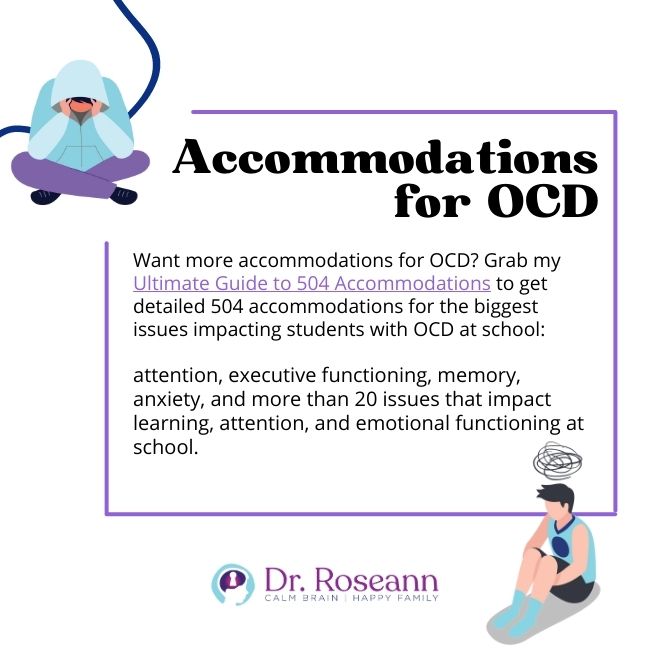
Solutions for Children and Teens with OCD
As a parent of a child with OCD, it can be challenging to find effective treatments that work for your child's unique symptoms and needs. While 504 accommodations and other supportive measures can help students with OCD succeed in the classroom, it is important for a parent to address the underlying causes of OCD.
Our BrainBehaviorReset™ Program, which incorporates CALM PEMF™, neurofeedback, supplements for OCD, and ERP therapy is designed to help children with OCD overcome their symptoms and improve their quality of life. By incorporating these three treatments into our one-on-one comprehensive program, the BrainBehaviorReset™ Program offers a powerful natural solution for children with OCD and their families.
With our BrainBehaviorReset™ Program, parents can have hope for their child's future. By addressing the underlying causes of OCD and providing effective treatment and support, children with OCD and their families can learn to talk back to OCD.
If you are a parent of a child with OCD, consider exploring the benefits of the BrainBehaviorReset™ Program. With CALM PEMF™, neurofeedback, and ERP therapy, this program offers a comprehensive and effective solution for children with OCD and their families. By taking action and seeking out the best treatments for your child, you can help them achieve their full potential and live a happy, healthy, and fulfilling life.
Citations:
U.S. Department of Education. (2016). Parent and Educator Resource Guide to Section 504 in Public Elementary and Secondary Schools. Retrieved from https://www2.ed.gov/about/offices/list/ocr/docs/504-resource-guide-201612.pdf
Always remember… “Calm Brain, Happy Family™”
Are you looking for SOLUTIONS for your struggling child or teen?
Dr. Roseann and her team are all about solutions, so you are in the right place!
There are 3 ways to work with Dr. Roseann:
You can get her books for parents and professionals, including: It’s Gonna Be OK™: Proven Ways to Improve Your Child’s Mental Health, Teletherapy Toolkit™ and Brain Under Attack: A Resource For Parents and Caregivers of Children With PANS, PANDAS, and Autoimmune Encephalopathy.
If you are a business or organization that needs proactive guidance to support employee mental health or an organization looking for a brand representative, check out Dr. Roseann’s media page and professional speaking page to see how we can work together.
Dr. Roseann is a Children’s Mental Health Expert and Therapist who has been featured in/on hundreds of media outlets including, CBS, NBC, FOX News, PIX11 NYC, The New York Times, The Washington Post,, Business Insider, USA Today, CNET, Marth Stewart, and PARENTS. FORBES called her, “A thought leader in children’s mental health.”

She is the founder and director of The Global Institute of Children’s Mental Health and Dr. Roseann Capanna-Hodge. Dr. Roseann is a Board Certified Neurofeedback (BCN) Practitioner, a Board Member of the Northeast Region Biofeedback Society (NRBS), Certified Integrative Medicine Mental Health Provider (CMHIMP) and an Amen Clinic Certified Brain Health Coach. She is also a member of The International Lyme Disease and Associated Disease Society (ILADS), The American Psychological Association (APA), Anxiety and Depression Association of America (ADAA) National Association of School Psychologists (NASP), International OCD Foundation (IOCDF) International Society for Neurofeedback and Research (ISNR) and The Association of Applied Psychophysiology and Biofeedback (AAPB).
© Roseann-Capanna-Hodge, LLC 2023
Disclaimer: This article is not intended to give health advice and it is recommended to consult with a physician before beginning any new wellness regime. *The effectiveness of diagnosis and treatment vary by patient and condition. Dr. Roseann Capanna-Hodge, LLC does not guarantee certain results.






